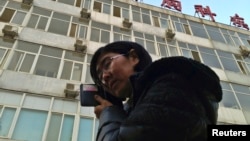BEIJING —
On the eve of China's National People's Congress, human rights activists are urging the Chinese government to further reform the of rule of law and allow freedom of speech. Their requests come as friends of one activist say she is dying while in police detention.
Cao Shunli, a prominent human rights activist in China, was in police custody when she suffered organ failure last weekend - a result, her lawyers say, of not being allowed to get proper treatment for tuberculosis and liver disease.
Cao was arrested last fall after staging sit ins outside of China’s Foreign Ministry. She was protesting for the Chinese public to be allowed to participate in drafting China’s national human rights report ahead of a review by the United Nations. She has remained in detention every since.
Fellow activists, who fear she may only have days to live, say it’s another sign of a crackdown on dissidents by the Chinese government and are pressing for change as China’s top legislators meet in Beijing for the National Party Congress.
“For those who managed to get across to meet her, it seems that she is in a very critical situation, and she might have only a few more days to live,” stated Maya Wong, a researcher with Human Rights Watch.
When asked how activist Cao Shunli’s declining health reflects on the status of human rights in China, Foreign Ministry spokesperson Qin Gang said the two are unrelated.
He said Cao is suspected of violating laws and committing crimes and that relevant Chinese authorities are working in accordance with the law. He says Cao’s case has nothing to do with China’s human rights situation.
News of Cao’s worsening condition came days after the arrest of another prominent activist, Ilham Tohti. Tohti was a respected scholar, economist and longtime champion of the rights of ethnic minority Uighurs. Uighurs are China’s mostly Muslim ethnic group who live primarily in Xinjiang Province. Xinjiang has been a center of protests and unrest for the last several years. Police charged Tohti with separatism last week, and his lawyer says Tohti could receive the death penalty.
In a letter Tuesday to President Xi Jinping and National Party Congress Chairman Wu Bangguo, the international rights group Human Rights Watch urged several reforms, including greater freedom of speech and rule of law.
Last year, China did abolish its re-education through labor system, but Wong says that move will not have a large enough impact on rule of law and human rights in China.
“The government tries to present some piecemeal reform to try to satisfy the public,” Wong added.
Lawyer Teng Biao said repression and detention of dissidents has increased over the past year, but so have the number of people who are protesting. “Even if so many human rights activists are being arrested, there are still more and more people becoming human rights activists, so the hope is in civil society not in the central government,” he said.
Many of those people are speaking out for reform; Xi Jinping’s challenge over the next year will be meeting those demands while maintaining Party rule.
Cao Shunli, a prominent human rights activist in China, was in police custody when she suffered organ failure last weekend - a result, her lawyers say, of not being allowed to get proper treatment for tuberculosis and liver disease.
Cao was arrested last fall after staging sit ins outside of China’s Foreign Ministry. She was protesting for the Chinese public to be allowed to participate in drafting China’s national human rights report ahead of a review by the United Nations. She has remained in detention every since.
Fellow activists, who fear she may only have days to live, say it’s another sign of a crackdown on dissidents by the Chinese government and are pressing for change as China’s top legislators meet in Beijing for the National Party Congress.
“For those who managed to get across to meet her, it seems that she is in a very critical situation, and she might have only a few more days to live,” stated Maya Wong, a researcher with Human Rights Watch.
When asked how activist Cao Shunli’s declining health reflects on the status of human rights in China, Foreign Ministry spokesperson Qin Gang said the two are unrelated.
He said Cao is suspected of violating laws and committing crimes and that relevant Chinese authorities are working in accordance with the law. He says Cao’s case has nothing to do with China’s human rights situation.
News of Cao’s worsening condition came days after the arrest of another prominent activist, Ilham Tohti. Tohti was a respected scholar, economist and longtime champion of the rights of ethnic minority Uighurs. Uighurs are China’s mostly Muslim ethnic group who live primarily in Xinjiang Province. Xinjiang has been a center of protests and unrest for the last several years. Police charged Tohti with separatism last week, and his lawyer says Tohti could receive the death penalty.
In a letter Tuesday to President Xi Jinping and National Party Congress Chairman Wu Bangguo, the international rights group Human Rights Watch urged several reforms, including greater freedom of speech and rule of law.
Last year, China did abolish its re-education through labor system, but Wong says that move will not have a large enough impact on rule of law and human rights in China.
“The government tries to present some piecemeal reform to try to satisfy the public,” Wong added.
Lawyer Teng Biao said repression and detention of dissidents has increased over the past year, but so have the number of people who are protesting. “Even if so many human rights activists are being arrested, there are still more and more people becoming human rights activists, so the hope is in civil society not in the central government,” he said.
Many of those people are speaking out for reform; Xi Jinping’s challenge over the next year will be meeting those demands while maintaining Party rule.




